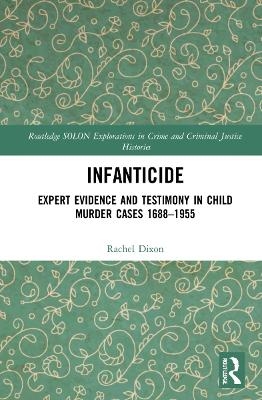
Infanticide
Expert Evidence and Testimony in Child Murder Cases, 1688–1955
Seiten
2021
Routledge (Verlag)
978-0-367-43889-0 (ISBN)
Routledge (Verlag)
978-0-367-43889-0 (ISBN)
Infanticide examines medical expert evidence in infanticide cases, focusing specifically on the shifting notion of ‘certainty’ in medical testimony.
Infanticide examines medical expert evidence in infanticide cases, focusing specifically on the shifting notion of "certainty" in medical testimony. Beginning in the Early Modern period and concluding in the mid-twentieth century, it considers how courts determined whether an infant died from natural causes or other reasons, including violence.
The book explores expert evidence in cases of infanticide and examines the extent of certainty created by medical specialists who founded their testimony on anatomical exploration and science. As the book progresses, it becomes clear that medical specialists were unable to scientifically establish cause of death and in doing so conveyed uncertainty in court proceedings. Rather than being regarded as a professional failing, Dixon argues that the uncertainty created by medical specialists redirected the outcomes of infanticide cases. The combination of uncertainty and the changing perceptions of infanticidal women by the court lead juries to find infanticidal women not guilty of a capital offence in many cases.
This book will be of great interest to students and scholars of Criminology, Law and History.
Infanticide examines medical expert evidence in infanticide cases, focusing specifically on the shifting notion of "certainty" in medical testimony. Beginning in the Early Modern period and concluding in the mid-twentieth century, it considers how courts determined whether an infant died from natural causes or other reasons, including violence.
The book explores expert evidence in cases of infanticide and examines the extent of certainty created by medical specialists who founded their testimony on anatomical exploration and science. As the book progresses, it becomes clear that medical specialists were unable to scientifically establish cause of death and in doing so conveyed uncertainty in court proceedings. Rather than being regarded as a professional failing, Dixon argues that the uncertainty created by medical specialists redirected the outcomes of infanticide cases. The combination of uncertainty and the changing perceptions of infanticidal women by the court lead juries to find infanticidal women not guilty of a capital offence in many cases.
This book will be of great interest to students and scholars of Criminology, Law and History.
Rachel Dixon began her career as a nurse and later a midwife before studying Law at the University of Hull, Hull, England. She is currently a lecturer in Law at the University of Hull, where she teaches Criminal Law and Criminal Justice. This book is her PhD thesis and her first publication.
Introduction
A historiography of infanticide and the use of medical experts in criminal trials
Midwifery evidence in infanticide cases
The role of medical men in infanticide cases
Medical evidence and mental state of the infanticidal woman
The expert evidence of the pathologist in infanticide cases
Conclusion
Bibliography
| Erscheinungsdatum | 22.11.2021 |
|---|---|
| Reihe/Serie | Routledge SOLON Explorations in Crime and Criminal Justice Histories |
| Verlagsort | London |
| Sprache | englisch |
| Maße | 156 x 234 mm |
| Gewicht | 340 g |
| Themenwelt | Geschichte ► Teilgebiete der Geschichte ► Militärgeschichte |
| Recht / Steuern ► EU / Internationales Recht | |
| Recht / Steuern ► Rechtsgeschichte | |
| Recht / Steuern ► Strafrecht ► Strafverfahrensrecht | |
| ISBN-10 | 0-367-43889-5 / 0367438895 |
| ISBN-13 | 978-0-367-43889-0 / 9780367438890 |
| Zustand | Neuware |
| Haben Sie eine Frage zum Produkt? |
Mehr entdecken
aus dem Bereich
aus dem Bereich
neueste Manipulationstechniken als Waffengattung der NATO
Buch | Softcover (2023)
Westend (Verlag)
24,00 €
Deutschlands Schwäche in der Zeitenwende
Buch | Softcover (2023)
C.H.Beck (Verlag)
18,00 €


